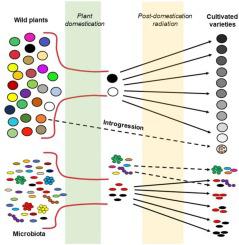Systematic and Applied Microbiology ( IF 3.3 ) Pub Date : 2020-06-26 , DOI: 10.1016/j.syapm.2020.126106 Esperanza Martínez-Romero 1 , José Luis Aguirre-Noyola 1 , Nataly Taco-Taype 2 , Julio Martínez-Romero 1 , Doris Zuñiga-Dávila 2

|
Human life became largely dependent on agricultural products after distinct crop-domestication events occurred around 10,000 years ago in different geographical sites. Domestication selected suitable plants for human agricultural practices with unexpected consequences on plant microbiota, which has notable effects on plant growth and health. Among other traits, domestication has changed root architecture, exudation, or defense responses that could have modified plant microbiota. Here we present the comparison of reported data on the microbiota from widely consumed cereals and legumes and their ancestors showing that different bacteria were found in domesticated and wild plant microbiomes in some cases. Considering the large variability in plant microbiota, adequate sampling efforts and function-based approaches are needed to further support differences between the microbiota from wild and domesticated plants. The study of wild plant microbiomes could provide a valuable resource of unexploited beneficial bacteria for crops.
中文翻译:

通过植物驯化修饰的植物菌群。
在大约10,000年前在不同的地理位置发生了明显的农作物驯化事件之后,人类的生活就很大程度上取决于农产品。驯化选择了适合人类农业实践的植物,对植物微生物群产生了意想不到的影响,这对植物生长和健康产生了显着影响。除其他特征外,驯化还改变了可能改变植物微生物群的根系结构,分泌物或防御反应。在这里,我们对来自广泛食用的谷物和豆类及其祖先的微生物群的报告数据进行比较,结果表明,在某些情况下,驯养和野生植物微生物群中发现了不同的细菌。考虑到植物微生物区系的巨大差异,需要适当的采样工作和基于功能的方法来进一步支持野生植物和驯养植物的微生物群之间的差异。对野生植物微生物群的研究可以为作物提供未开发的有益细菌的宝贵资源。











































 京公网安备 11010802027423号
京公网安备 11010802027423号